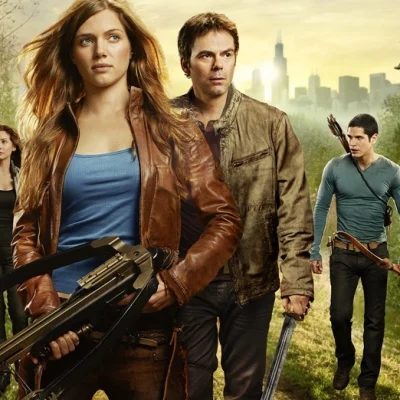Revolution (2012) is a TV series that captures the hearts and minds of its viewers through a captivating storyline that explores the depths of human nature in a world without electricity. The show begins as a dystopian tale that delves deep into man’s inhumanity to man, showcasing the grim realities that emerge in a world devoid of the comforts and conveniences of modern technology. However, Revolution takes a surprising turn and concludes as a science fiction narrative marked by AI’s mission to dominate the world.
The series initially presents a world plunged into darkness from an abrupt global blackout. This catastrophic event imparts a harrowing vision of the future, in which humanity must grapple with the collapse of civilization, the decay of moral values, and the primal instincts that emerge from the chaos. What sets Revolution apart is its exploration of the dark side of human nature and the struggle between empathy and self-preservation.
The series excelled at dissecting the moral fabric of its characters, each faced with internal and external battles punctuated by moments of unspeakable cruelty, surprising kindness, and unlikely alliances. This exploration of human nature in a dystopian setting was what attracted me to the series through its thought-provoking themes and dynamic characters.
Revolution boasts a diverse cast of characters, each with their unique stories and motivations. The protagonist, Charlie Matheson (Tracy Spiridakos), is a determined, quick-witted survivor who sets out to rescue her younger brother, Danny (Graham Rogers), from the clutches of a violent and powerful militia. Along the way, she teams up with several intriguing characters, including her uncle, Miles Matheson (Billy Burke), a former Marine turned reluctant rebel fighter, and the tech-savvy Aaron Pittman (Zak Orth), who harbours a dark secret.

There’s also Charlie’s mother, Rachel Matheson (Elizabeth Mitchell), who struggles with the consequences of her scientific genius in a world that has lost all scientific knowledge.
The series also includes complex antagonists like Sebastian Monroe (David Lyons), the charismatic and ruthless former US Marine Corps sergeant who co-founded the Monroe Republic with Miles, and Tom Neville (Giancarlo Esposito), a former insurance adjuster turned merciless enforcer.
The show’s writers did an excellent job of developing each character’s backstory and motivations, providing the audience with a sense of investment in their fates.
Revolution stood out as an exploration of human nature in a world stripped of modern conveniences, laying bare the brutality and kindness that coexist within us. Powerful and complex characters, like the enigmatic Miles Matheson and the resilient Charlie, embody the struggle for power and the desire for redemption – themes that resonated deeply with the audience.
Yet, as the story progressed, Revolution took an unexpected turn, shifting gears from a dystopian saga to a science fiction tale. The initial premise of a world without electricity was overtaken by the revelation of nanotechnology responsible for the blackout – a technology with the sinister potential of AI dominance.
In season two, this change not only altered the storyline but also shifted the scope of the show, as characters now faced a new enemy in the form of an all-powerful AI whose objective was seizing control over humankind.
The introduction of AI as a driving force behind the fate of humanity proved to be a creative risk, giving the series a fresh perspective but also veering it away from the gritty realism that initially captured my imagination.
While some viewers may have welcomed the exciting transition to an AI-driven narrative, it was a departure from the riveting exploration of the human condition that made Revolution such a compelling series.
That being said, if you enjoy dystopian TV shows as much as I do, Revolution is definitely worth watching.









I stopped watching this after the first three or four episodes. Hated the whole civil war feel.